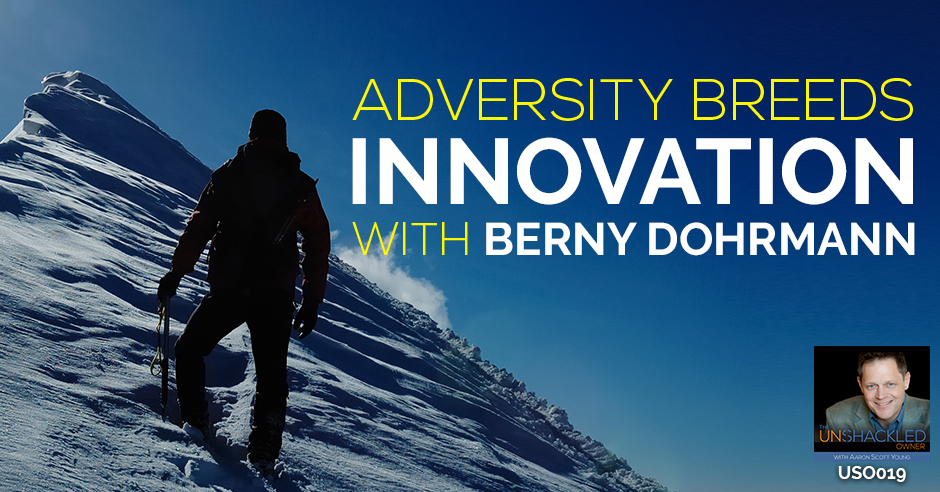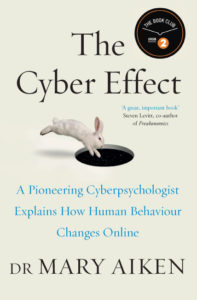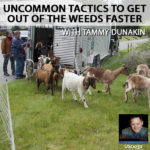
I’m so glad you’ve come and you want to hear these stories and learn these lessons. I keep trying to bring you the most fascinating, most interesting, most accomplished people in my life. Today is no different. I’ve roped one of my great friends and mentors to be here with us today and to share some of his life’s journey. The fellow that I will be talking to, who we’ll be visiting with today, is Berny Dohrmann. He’s the founder and Chairman of something called CEO Space. I discovered CEO Space about six years ago, 2011. I went for the first time in September of 2011 and got to know Berny a little bit. I was then invited to be a presenter, a speaker, a trainer at his events. Now, these events have been going on for 30 years. You’d think that’s a whole career, but actually Berny had a whole other career as an investment banker before that.
I wanted to get Berny on the show to talk to us about, how do you build businesses and how do you help other people build businesses through raising money and so on. What is an investment banker looking for? What does somebody who’s a mentor and a guide and a trainer to tens of thousands of CEO’s, what does he learn from talking to all these people? Just on a personal note, Berny and I have become very dear friends and have been through some difficult times together. There was a time when I had some heart surgery and it was a little touch and go, and Berny was the guy there talking with my wife. We have a very personal relationship. I just want that to be evident. With that introduction, I want to introduce the Chairman of CEO Space and one of the really great worldwide known mentors to so many famous people, that’s Mr. Berny Dohrmann.
Listen To The Episode Here
Adversity Breeds Innovation with Berny Dohrmann
Welcome, Berny. It’s so nice to have you on the show.
That was a little gushy and mushy. Now, they’re going to know the secret that you can be an unshackled entrepreneur and we actually have a lot of fun doing it. We don’t want them to know all about the fun because a lot of them are work addicts and they want to be in stress and toil. They like the addiction of it. We’re trying to break them and let them see that you work for wealth, not cashflow. You always think more cashflow and you have a lot more fun.
That’s the whole goal, as you so eloquently just put it, of this show, is to say you work a lot, I work a lot. But we work on things that we love. We’re not stuck doing something that we’re miserable at doing. Unfortunately, too many business owners are the critical employee in their business. Let’s talk about that. When I first met you, you had somehow fallen into the position of being really the most critical employee in CEO Space. You were running your tail off all over the country, all over the world. You were the main closer of people when people are joining CEO Space. But you’ve made significant, really dramatic strides since I’ve known you of unshackling yourself from that. How did you fall into that trap of being that and what was it that shook you out of it?

Adversity Breeds Innovation: Until I became unshackled, it was like a balloon that was tied to the chair. I couldn’t float.
Really, you. We were having our big philosophical discussions and sweets in the evening in 2011 and 2012 as we got closer. We both were having great success but we’re work addicts, like I said earlier, we were really addicted. Our self-esteem, our identity, our selves was that we had to be in everybody, every department, every division, management. We teach the opposite. We teach the greatest unshackled leaders. We coach them. We started talking about ourselves and saying, “What are we doing? Are we crazy?” Both of us decided that unshackling was the only thing we had to example of what we were both teaching. But in your case, and we both talked about it, was the need for a product to get out there to unshackle them. Because the tools, the tactics of doing that. What I did in 2013, after you and I had developed all this intellectually for ourselves, I reformed my life and stepped out of operations in my own business after decades.
In not running it, in being the chairman and directing it but not running it, not being the day to day operations, I have had more fun, more freedom, more time. I call it the bottom and the top of the hour glass. My vision was to work with world governments. But I was coaching all these executives and never had time. I leave Sunday for Romania. I’m going to India to meet Modi. I’ve got meetings with Net and Yahoo and the teams in Israel. I’ve got meetings around the world that I’m setting up that relate to shaping economics and forward planning for nations. That’s the top of the hour glass. That’s what I wanted to do with my life. Until I became unshackled, really it was like a balloon that was tied to the chair. I couldn’t float. When you get unshackled, you make more money, you have more freedom, and you’re able to have power and influence and do things in your life. If you’re a life coach, you can do that. We can show you how before Aaron and I get off today.
Let me drill down on this just a little bit. Just to go deeper on this point, one of the things that you did was you had a management structure that existed for a long time. Then things changed and people went off to other adventures and you had to pick up and shoulder that, which I know a lot of our listeners have probably been through that. They had a good team. They had the workload broken up. But then something happened where they had to step back in and do their thing. Then you can fall into that rut again. I’ve watched you handoff gently and through good planning, handoff management, handoff running the events, and handoff the sales. You’ve had a vision the entire time. I’ve watched you do that. Isn’t it true that you just can’t do it all yourself if you want to grow? You have to have people that can be responsible.
I think at the end of life, you don’t have a real business. If it’s Zig Ziglar or Tony Robbins, a personality company, if you’re competent like Tony, can become a very large business. But when something happens to Tony, selling the brand value, magnifying its growth really truncates. I just don’t see how, as that, on a personality basis, ages, what’s the value of an 80-year-old Tony Robbins? I think that you want to build Carnegie. You want to build a Landmark Forum. You want to build CEO Space. You want to build Laughlin. You want to build brands. Richard Branson of Virgin Airlines is always saying, “It’s the brand, it’s the brand, it’s the brand. Build the brand value.” When you build a model that can go on without you and you can affect more people in a week than you could ever affect, you just figure that out as far as an organizational exercise with mentors, then you help more people which is why you make more wealth. Your system should help the most number of people for a brand value, not for a personality value.
I’m the third owner. My business partner, Lee Morgan and I, are the third owners of Laughlin Associates. I look at that 45-year-old company and even though I’ve had it for, at the taping of this interview, sixteen years, so a third of its life, I look at myself as a steward for the brand. It’s not me. It’s somebody that was there for a long time before I got there. I want it to go on long after I sell it or I leave this world. This is such golden information, that it’s about building a great brand. A lot of car dealerships have the founders name on them or something and then eventually the founder’s dead, you see the kids or the grandkids doing the TV commercials. It’s still that brand. It didn’t die with the owner. If you can build something that’s built around systems and not just around your sparkling personality, you have a much greater likelihood of having something that not only can you step away from but you can also sell.
Berny, let’s go back some decades. Give us how you got into your first career and then how and why did you make this leap from investment banking to personal development? Just take us back and give us the synopsis.
When I was going to college and studying economics to get degrees in Economics and be a Business Major on that side, my job was with the man that financed the first supertankers with the company called Monetary Resources at that time. Back in the late 60s, nearly 70s, to get a multibillion dollar deal done, and as a young man in college, watch the owner of the company hand you a commission check on the flight home from Monte Carlo of $290 million, you’re pretty much done pumping gas once you see how all that works. Gas was $0.37, so that was a big number then.
I was going to school with George Witter who was of a family of a brokerage firm that then was very big. It wasn’t merged into Morgan. It was called Dean Witter. It was a family company. I knew the people. Bill Witter was the chairman. George Witter, who died at 34, one of my dear friends and mentors, had me in the underwriting group at the same time as that oil tanker. I would see how they did a $3 billion underwriting in 72 minutes and put it all together in the market, and then went to lunch and had their fees for that underwriting, and how those fees were ongoing and how investment banking really works. It usually takes years and years to be inside syndicated underwriting; how they’re packaged, how they’re put together, working with the law firms. I was getting mentored and all that over a few years while I was going to college and economics. George said I was really gifted in this area and if I’d start my own firm, they’d give me some of the crumbs off their table.

Adversity Breeds Innovation: I was very fortunate to have particularly wonderful mentors in the field I had chosen.
I built up one of the fastest growing brokerage firms in America, ended up thousands of stock brokers, publicly traded. Shearson was not merged. It was our primary market maker in our stock, because you can’t be the market maker in your own stock when you’re a broker dealer. We were early to be a public broker dealer. It was just a lot of stature. I wrote a blog on this, David Rockefeller, who was one of our mentors, he died in his sleep this week at 101 years of age. He was mentoring me on how it worked in Wall Street when I had the offices in New York. He was one of my really great mentors. The last time I saw him was in Jerusalem. I really missed him, but I knew he was at his time, at 101 years old, to go on. I watched him change the world of Economics as head of Chase Bank. I watched him change brokerage firms, structures of how money would be placed, sovereign nation funding, sovereign nation wealth funds, and inventions that fell out of this man’s mind. I just was very fortunate to have particularly wonderful mentors in the field I had chosen, which was investment banking. I really was, in the 80s, quite mature, in fourteen countries, head of a big public company, fleets of planes, and really young. I’m in my 40’s.
My dad, who’s a very famous human potential trainer, gets cancer and his company is not able to be operated by any of the other children. I had 22 years in the brokerage business. I sold the firm and went to work in my father’s business. On the good days, he could be Allen G. Dohrmann and be working with Fortune 100 board chairman. On bad days, there were different levels of bad and finally he graduated. I didn’t want to be in human potential because that was his work. But I ended up where I had taken over his corporate training company. In the late 1980’s, we morphed it into CEO Space. It slowly became what it is today.
First of all, it was one of those things where you needed to give up, you needed to walk away from something that was very heady stuff. Young, wealthy, private planes, hobnobbing with the financial elite and anybody else. I’m sure all sorts of nonprofits were all coming to you and you were probably a donor for lots of this.
Seventeen buildings, almost 2,000 employees, just imagine the fleets of planes. It was a big operation.
You leave it to take care of your dad. Through that you end up picking up the pieces for him, for his business, and going off to do that. You started CEO Space and here it is now almost 30 years later. Tell me, has it always just been a smooth growth trajectory, for somebody with all your training and background and mentorship? Or did you ever stumble anywhere along the way?
I’ve had numerous stumbles. The biggest one: My best friend that I grew up with, went to Catholic high school with, who became a magna cum laude prosecutor from Stanford, instead of being the $500,000 a year lawyer, went into work in a very low pay as a US Attorney General. At this time of his life, he is about to retire. He now wants to have a win against his friend. On Christmas, he indicts me on the last day it could be done, years after I sold the brokerage firm, for $87,000 for contempt of court. It wasn’t for taking money or fraud or misrepresentation. It was a very unique kind of crafting. Frankly, we didn’t understand it. I missed that Christmas, which was his intention, because I had to fly to San Francisco from the East Coast and appear and plead not guilty and so forth. But I ultimately lost that. He made sure that I would serve in chain gang Alabama and have really challenging experiences.
I probably had more to manage as far as making sure I was able to make a positive out of that, that I was able to forgive him, that I was able to keep my spiritual faith and my main business plan, which is that God’s plan for our lives, for your life is so much greater than our plan could ever be for our lives. That event later would define me as a rockstar. It would create my coaching for the largest chairmen and business leaders in the world. Many of them want my advice how not to have that happen to them. Government leaders when they have crisis, I often get calls for, “How do I handle this? What do I do with this?” Because they feel that I, over the years of using that positively and coaching people, because it’s decades ago, I’ve coached for so many years the largest law firms in the world where I’ve been part of the resources of the law firms. You’re reading about it in the news and we’re trying to manage it. I’ve been a resource behind that, which is then affecting positively some wonderful people who get falsely accused in today’s world. I think that we’ve gone a little crazy. I like the idea of America. I like the idea that people should be really innocent until they’re absolutely not.
If we have a system that needs reform, it’s because good people can be caught up now. We used to have a system that they’d let two or three guilty people go before they put an innocent people in jail. Today, they’ll put you or anyone in jail to make sure they get all the guilty people. It’s not America. We can be safe and also be free. For our children and the unborn generation, we need to, and we work very hard as a lobby group in Washington, to reform justice. We’ll see if the present administration and the Attorney General, that I just wrote this week, might not step into the kind of justice reform we haven’t seen for a while. I’m interested in hoping that we might get that.
All that Berny just said comes down to this: Things are going to happen to us in our lives. Things are going to come along that were never on our list of goals or our bucket list or our dream board. We have to make a choice of how do we deal with those things. How are we going to let that impact us today, those around us? Also, how is it going to work for us going forward? I know the first time I ever spoke to Berny, I said, “Before you put me on your stage, there are some things you need to know about me.” We shared our stories of making this battle and what it’s done to us in a positive way and also the frustration. Just know that whether it’s prison, divorce, the loss of a child, an illness, a business setback, whatever it is, whatever you’re dealing with, if you can have a great attitude about it and look for the lessons, you can come through it in a powerful way.
I want to talk about some of these things, Berny, because you see so many people that are starting companies, they’re growing companies, they’re trying to transition from being a mom-and-pop to a bigger brand. What are some of the things that you see happening right now in small business? What are some of the mistakes that you see these burgeoning entrepreneurs make?

Adversity Breeds Innovation: The game is how to make sure you excite enough people about whatever your genius is that’s reaching the market.
I really think that they don’t have a really good plan. They don’t have a team or two or three mentors that know their own business that’ll help them not make mistakes; be the double line so they don’t have to curb as they pick up speed. They don’t plan the resources, which can be connections, critical contacts, oftentimes capital. All of that creates a bad sequence list. They’re doing everything right in the wrong sequence. Therefore, they struggle and they don’t have surplus. They don’t live in a place called surplus, where they have more money than their bills every single week and they can predict and control that. The game is how to make sure you excite enough people about whatever your genius is that’s reaching the market, that the number of people you’re serving is accommodating your surplus state and you’re always in it. It really is strong plan, strong teams and the resources to execute and resetting your sequence.
This failure to understand the real cost of growing your business so that you start making a lot of money, but it’s consumed. You see in the scaling of Laughlin, as the number of customers rise in geography, it becomes a ratio that you have to watch because you can’t allow the customers to not have the service. You have to have enough fixed overheard, staffing, trained staff, to give that great Laughlin experience. It probably took you some time to get your own cost of growth down so you understood it and then could scale it. Once you have that, it’s exciting.
In my situation, I learned that a long time ago in some of the earlier companies. When we come in now and work on a project like we have with the bundle of incorporation businesses that we’ve bought and merged together, you do learn that. I love what you said, because one of the biggest challenges that somebody has as they’re growing, that I notice at least, is that you’ve got somebody who has this idea, they’ve got the skillset, they’re way underfunded, they’re trying to bootstrap this thing and do it out of the backseat of their car and they start to get a little traction, start to make a little money. Now they’ve got what feels like surplus to them.
But they desperately need that operations person or that salesperson or that technology person or whatever. They fear hiring that next person they need or that first person that they need because that’s going to cut into the money that they’re now able to consume and use as lifestyle money. They’ve moved in to all the money they’re making. They think, “If I make a bad decision or if I hire somebody, that’s going to cost $5,000, $6,000, $7,000 a month out of my household. I don’t know if I want to do it, or maybe I can do it myself or I can get somebody who’s really unqualified to do it cheaper.” Then they wonder why they never break out, why they’re always just barely making it. Because they’ve tried to consume all the money at the early stages instead of living low.
Remember, Mark Cuban talks about when he was growing his company, he didn’t take any money for a long time. He was eating ketchup and macaroni and cheese and living low to keep the money in the business. When it finally did really take off, he had some team and now he’s a billionaire. It’s troubling for me to see people that have plenty of good ideas and talent, but the sequencing is completely off. That’s one of the things I love that I’ve really learned from you and from being involved with CEO Space, is I think I was doing it but I didn’t have a conscious awareness of sequencing. That’s language that is talked a lot about at CEO Space. Do the right thing in the right order. Because if you do the right thing in the wrong order, you’re not going to get the result you wanted. How did you come to be such an evangelist of that concept?

Adversity Breeds Innovation: Everything we do today and every step we take is to get to the flag on the hill, so you will be unshackled.
Really it’s a product of 22 years being a master student of investment banking and economists, where you’re tearing apart all these different industry silos. People come in for funding to Wall Street. Yale and Harvard and the best minds at the head water of money are looking at these businesses in reverse and looking at all the micro details. Believe me, after 22 years of watching them and being in the rooms, the merger acquisitions, the places where 80% of the people walk away and they don’t get the money, it was seeing that if someone had set them up, if someone had just taught them, if someone had mentored them, they could have got it. They just didn’t know these basic elements. No one was teaching them. We couldn’t find universities even today. To get the guidance from Wall Street, they start to charge you $150,000 to say hello and they’ll groom you. But what we did was formed a way to let really the smaller businesses have the advice and advantages that normally only the big companies get.
Frankly, I can’t do that alone. We brought in talent like you that have merged and acquired businesses and had to do the analytical work, who get it, and experts in various parts of it, so that the owners could have the individual guidance at some affordability level, because they don’t have money at these early stages. Help them to get the freedom of ramping up to really start what you and I started as a movement and you’re bringing out as a product, which is that unshackled entrepreneur is where you plant your flag on the hill. You’re like Marines. Everything we do today and every step we take is to get to the flag on the hill, so you will be unshackled. It’s a process. It’s not something that you are looking to do when we are done with this show. It is something that you now have in your thinking and you know as your better improved plan. It always creates wealth versus cashflow. You’re not trying to just pay bills. The result of having a better wealth plan serves more people. That plan is always going to make you more income and give you more freedom. How many times have you seen that to be true, Aaron, when it’s applied?
Every time, everybody that I’ve ever seen who’s been able to recreate success. Now, there are some people who become successful almost like everything conspired in their favor and they were at the right place, the right time, right pet rock idea or whatever it was. They have a big homerun and hooray. But most of those people that I meet are never able to recreate any semblance of that first success. You mentioned Richard Branson earlier. To Branson’s head, hundreds of failures, but he fails forward. He keeps moving the ideas forward and he keeps trying. He uses a sequence. When you combine a good idea or a timely idea with a good sequence, then the ability and the confidence to start assembling a team, even if it’s a virtual team at first, those people do it over and over again.
I don’t care what anybody says, positive or negative. You can say a lot of positive, a lot of negative about our current president. But here’s a guy who started with, really in real terms, a million dollars is not that much money. You can’t even get a McDonald’s franchise for a million dollars anymore. A million bucks, built it into multimillions, crashed and burned, bankruptcy all over the place, falls off the Forbes 400 list. He’s comparatively lost everything. Then builds it back up again and becomes a billionaire again, and against all odds says, “I’m going to run for President,” and he does it. That doesn’t happen by accident. It’s not some trick anybody played. This happens because you follow a sequence of building a brand and building a movement that gives you a certain result.
The audience should look to a watershed moment, which you’re well familiar with, which is once you have a better plan, it often takes some capital. Capital in your business is pulling your slingshot back so you can hit the bulls eye, because otherwise you don’t have enough energy to get from the market; the velocity which you hit the bulls eye, you’re stopping short. Capital today is easy. They changed the rules to make small business have the easiest time in a hundred years, low cost, you can have a capital offering out in two weeks. It’s just learning. It’s not hard. It’s just new.
I want you to get this, capital works harder than you do. When you advertise, when you have public relations articles, when you have your brand being brought to your target market over and over and over until they click and buy, capital gives you websites that actually convert clicks to buying. Much better quality conversion sites. They create social storms, paid to click advertising that’s right. Now you, month to month to month, have that muscle working for you that is bringing in the customers in and scaling your business. You can never slave away and get there. Putting in some capital in your business for many, not all of you, but for many, that’s your next step. That’s your next priority. Get smart, get capital education, and learn. It’s just new. It’s not hard.
If you don’t have capital to run your business, if you don’t have the money to get between from month to month and all you’re doing is chasing money, my experience is the more you chase money, the more it runs away from you. If you can get organized and have a good capital raise or you have a way of bringing money from some other place that you have right now that you want to leverage out into the market, you’ve got to have a plan. Underfunding, undercapitalization is arguably the death knell to most companies. It doesn’t matter how great your ideas. If you don’t have the money to get it out to the world, nobody’s ever going to know it exists. There are so many great new ways. Without making this a CEO Space commercial, I do want to say that CEO Space is teaching some of the best capital classes about how to raise money, how to identify potential investors, what different offerings are available now, especially with the new rules for Regulation A and for crowdfunding and 504 and 506. All these rules have been amended to some extent to make it easier really for people to go out there.
The government’s completely clear that the government can’t make money. They need entrepreneurs, companies of 50 people or less, at least in 2015, which is the most recent statistic, 86.2% of GDP, gross domestic product, was created by companies of 50 employees or less. The government wants companies to get started and run it. They don’t want them to crash and burn. You need money. There’s no reason that there shouldn’t be easy access to money if you have a good plan. But you’re not going to get any money if you don’t have that sequence figured out. You have to have a good idea. You got to have a sequence. You have to have access to the right leadership team, and then you can get the money.

Adversity Breeds Innovation: With capital, you can really pour gasoline on the coals you’ve heated up.
What I think capital training’s value for all of you is it forces you in a skill set you’re acquiring, that you can do in three or four days, to go through looking at the things that capital requires. In reverse, it makes you do a better plan of how you’re going to spend the money, what the returns on the money are going to be, what the time frame is. Because capital wants you to increase your ability to predict and control the profit outcome that the profit is going to rise up. With capital, you can really pour gasoline on the coals you’ve heated up, because you’ve all proven your concept. Customers are buying what you have. They want it. You’re frustrated with, “Why can’t I get more? Why is there not a waiting list? Why is there not three months where they’re waiting?” Capital creates that. Capital works harder than you do. It forces a better plan, because you have to present to capital what it wants to hear, and so you learn that. It’s not hard.
Aaron, you’ve seen it. Say it’s Tanya with Green Glider, where she comes in with a mop head that’s super glued to a piece of wood. She uses that prototype with no business, two jobs, single mom, working in an apartment, living in an apartment, very little sleep time. She learns about capital. Now, she’s sold out on QVC and Home Shopping. She’s in Kroger’s and Walmart. She sold so that she has a huge business going. She’s not working any other job. She owns her own business. Capital put her into a better plan and she got it done. But she didn’t have education, she didn’t have background. You’ve seen so many like that, that they just learned. You can say to yourself, “My next priority is learning how to get capital in my business because I’m not going to work two or three years like this. I’m going to pull the slingshot back. I want an easier path.”
That’s one of the reasons I wanted to have you on today. I’ve seen so many great successes, everything from Green Glider to Tow Truck in a Box to Airborne to Chicken Soup for the Soul, Men are from Mars, Women are from Venus, all these good things that have come out of CEO Space. You’ve seen what works and what doesn’t work. You’ve gotten some really great golden nuggets. Remember, it really is not about magic, not about pixie dust, not about luck. It’s about having a great idea, differentiating yourself in the market, having a plan, knowing the sequence, having access to capital and other human resources as well as technology, which is so abundant now. When you figure out the system, when you get the recipe figured out, you can recreate the success over and over and over again. Berny’s watched it happen through his entire career from investment banking to mentoring small companies to working with government leaders, and it’s always, always, always about sequence.
What a great conversation we’ve been having today. Berny, I’m so glad you took time. I know you’re busy. I know you’re getting ready to go off to Europe. How cool that one of our great entrepreneurial experts and thought leaders gets to go over there and talk to these people. As we go into this section, I call it Golden Keys because we’re talking about being unshackled and everybody that I talk to on the show here has their little keys that have provided them the ability to become unshackled. This is not an exhaustive list but it’s certainly going to give people a chance to go back and learn, get a little peek behind the curtain of how your mind has worked and what’s been inspirational or valuable to you.
First thing is, you’ve written a lot of books. Guys, go to Amazon or look up Berny Dohrmann. Berny, you’ve written a lot of books. If you had to just pick one book, what book would you recommend to people, “Read this one if you really want to get your head on straight about how to build a business or about life.”?

The Cyber Effect: A Pioneering Cyberpsychologist Explains How Human Behavior Changes Online
Right now, if it’s just building a business, there are so many good business books. I don’t want to tell you my favorite, like there’s one that gives you all the answers. I think you need to be continually reading and get your top ranked business books. Google search top ranked and take those, scan and read them, all of them. If I had one I’m reading that I think is important in a super changed world, I think you have to get it right in the digital space. There’s a book called The Cyber Effect by Mary Aiken. That book is for CEO’s in the biggest companies in the world. I highly recommend you read The Cyber Effect for the trends you’re all seeing: the hacking, the dark side, the good side and the bad side, and what you have to do to remain current.
Let me give you just four quick keys of my own. My four keys for you are, one, you got to sit on your stage coach and see yourself as the bridal master. Don’t be one of the horses pulling the coach. You have to direct and give the queues and the way that bridal is going to hit that particular team of yours to bring you just to where you want to be. Become a bridal master and stop being in the stirrups and the harnesses trying to pull the wagon.
Second, have someone sitting next to you on the stage coach. The mentor who already knows how to drive the team in your game with that weight of stagecoach, with that cargo, with exactly what you’re delivering. Maybe you’re delivering bars of gold, it’s a different team that takes more horses for that weight. Maybe it’s grain, that agriculture product is a lighter load. Everybody eats three times a day. We have to know in your industry what you’re doing in the service or product. The mentor sitting next to you knows how to build a big business in that field. Use the most magic words, “Will you mentor me?” That gets you both a better plan and the right sequence, because they won’t let you out. They’ll be the double line so you won’t hit the curb.
Then get the resources, the critical pool of the mastermind team that is going to help you do everything that are the components of what you need to execute. Finally, any capital or resources in that area that you need to make sure you can take the horses all the way to the end. If you get those four in that sequence, you’re going to be unstoppable and you’re going to be unshackled.
Make sure you’re the one that’s an expert driver. Make sure you have a mentor.
The bridal master. Do not be in the harness.
Be the bridal master. You’re the one with the reigns in your hand controlling the team. You want to have a mentor sitting next to you. You want to have sufficient team to carry the load. Then the mastermind.
Mastermind is not a brainstorm. That is the people that are helping you make it, package it, do branding, that are people that know how to do marketing, those are people who know how to do accounting, administration. Those people are your team and they’re one mind to get all of it done, always on time and always at a quality you want. That’s your cornerstone team. You want them to be fully acquainted with how this business is trying to accomplish its vision. I know you do a lot of that work. That’s unshackled from your ranch up in the beautiful country of Washington State. You’re sitting there with all of the kids and farm and ranch animals, but you’re running this empire all over the world. Except for when you do television shows and go speak, you are unshackled with your family. You built a lifestyle that your wife said last night to you, “We just are everybody’s envy as a marriage and couple because we tell ourselves happier stories.”
I wouldn’t say we said that everybody was envious, but we did say that we choose the happier story and people wonder why we’re happy. It’s because we have built a life.
People really do comment about your marriage and my marriage, about how happy we are. But that’s another thing we create. If you don’t have it right at home, that’s another issue that’s going to affect you being unshackled. You’ve got to have your home life be your bedrock so you can have a foundation that allows you to soar.
September’s a great woman and a great companion for you. As you know, we just had our 30th anniversary with Michelle and I. It’s just the best thing in the whole world. Let me ask you another question. Do you have a favorite quote you want to share?

Adversity Breeds Innovation: If you could dream it, you could do it. It’s fun to do the impossible.
I have so many. As you know, I grew up with thought leaders. But I always go back because for me it was always Walt Disney walking outside our barbecue pit with 22 kids going to bed. They’d come over in the neighborhood, because he was there in 1954. Kneeling down and saying, “I didn’t tell you, children, if you could dream it, you were educated in the right school. I didn’t tell you if you could dream it, you had money and resources. I didn’t tell you if you could dream it, you were in the right neighborhood and have the right contacts. You children always remember what I told you. I told you that if you could dream it, then you could do it. If you could dream it, you could do it.” Then he got this impish look on his face as we head to run off to bed. Dad was saying, “Run off to bed now.” The kids had to go back to their homes in the neighborhood. He had this impish look and he raised his glass and said, “It’s fun to do the impossible.”
We could spend hours and hours just talking about Walt Disney. What an amazing guy. What a great experience for you to have been there as a child, to know him and meet with him and be inspired as a child. If you can dream it, you can do it. Berny, what kind of parting words of wisdom would you want to share with these listeners, these aspiring unshackled owners? How can people reach you, learn about what you’re doing, come to CEO Space? How would you like them to engage back with you?
They don’t have to wait. That’s the big thing. You don’t have to wait. You’re one set of getting information and options from speeding up everything. Find your process to accelerate and don’t wait. CEO Space, if you go online to CEOSpaceInternational.com, you go right to our website with videos in every industry. We’re Forbes and Inc Magazine’s number one business conference in the world this year. It’s not particularly hard to find us because we’re so highly ranked by third party press. It’s 30 years old. Go take a look at our option. We’re basically business accelerators and that’s what we love to do. If that fits at any time of your life and that’s the next priority, take a look at what we do and what makes sense for you.
There are some great videos on there. Look at what Bob Proctor did. Look at what Jack Canfield did recently. Lots of other videos. If you’re not familiar with everybody, you can go to some real highly visible well-known names.
Mark Victor Hansen started Chicken Soup at CEO Space. We’re sitting on the phone for three hours this week and he’s going to the Horatio Alger Awards in Washington DC. I got him in that. He’ll be there with Alan Siegel and a lot of the dignitaries. The President may drop by. Mark is setting up meetings with contacts we gave him while he’s in town and is working on the biggest environmental projects to help bring hydrogen fuel to the world to re-oxygenate the planet. He’s investing in longevity stem cell research. He sold Chicken Soup for $68 million. It’s just interesting that those things happen and those friendships go on and you do even bigger things together in the next phase. He’s totally unshackled. He’s in his multimillion dollar home in Scottsdale, Arizona. He’s doing just the dream life he wants, working with the players that are billionaires that are going to change the entire world and the heads of governments around the world to make sure that the world changes. He was saying to me, “With all the wealth and influence, all I want to do is make sure the unborn generation has the greatest environment and can breathe.” That’s his passion, that’s what he’s working on.

Adversity Breeds Innovation: Why did you start your own business? To have freedom, to have the thrilling life that you want to have, and freedom.
It’s fun to be the kind of center of their coaching and they’re looking for mentorship back and forth. Mark mentors me, I mentor Mark. Doing that over so many years, it’s fun to watch that unshackle philosophy start to get real traction as the right way to run a business. Because otherwise, you’re a wage slave. You’re just over broke. You have a business that’s not a business at all. It’s a job, worse than a 40-hour week job because you work 100-hour a week. You’re a wage slave. You own that job. You own it. It’s terrible to own a job. It’s better for you to build a real business that you got freedom from and you get joy from, that gives you freedom. Why did you start your own business? To have freedom, to have the thrilling life that you want to have, and freedom. The truth is, you’re 85% there, your glass is almost full. With just 15% more from listening to this, for instance, continuously as a process, you’re going to get the actual tools and tactics to fill the 15% and then you go to overflow. That’s when you’re unshackled.
No, that’s the magic, you said it beautifully. I think that’s a perfect way to go out. Berny, thanks for being here. I’m so grateful that you took the time. I love that you’re here. I love that you’ve been such a huge support and cheerleader and rocket fuel for me. You’re one of the most generous people with introducing and cheerleading that I’ve ever met.
Tell them about the kids, the most important part is the kids.
Twice a year in CEO Space, or maybe it’s three times, but I know in the summer and at Christmas time, July and December, they have this wonderful teen program at CEO Space where kids come and learn about personal development and about business. I’ve seen small groups, maybe fifteen or eighteen kids, and other groups that were up close to 100 kids, come together. They have a fabulous experience, utterly separate from their parents who were there. These are usually sixteen through college, so maybe sixteen to 21, 22 years old for the most part. My children have all gone through that program. Some of them numerous times. They just love it. As a matter of fact, my daughter, who came as a senior in college, met this handsome young instructor, the youngest instructor in the faculty, and now they’re married and have a baby. CEO Space even had brought my daughter her husband together and we have this fabulous little granddaughter now, all because of Uncle Berny.
We’ve got some really unbelievable gold from a guy who’s been around the block, who has made it over and over and over again, who’s weathered all kinds of challenges and remains on top, even right now, from Inc, from Entrepreneur, from Forbes, as the number one place to come and learn about your business. I can recommend learning from Berny Dohrmann. Read his books, attend CEO Space, or whatever you want to do. But here’s the thing, get a sequence, get the right team, have the capital. You have a tremendous opportunity of beating all the odds of becoming an unshackled owner. Until next time, I look forward to seeing you on the next podcast.
Links Mentioned
- AaronScottYoung.com
- The Unshackled Owner Twitter
- The Unshackled Owner Facebook
- Aaron Scott Young LinkedIn


